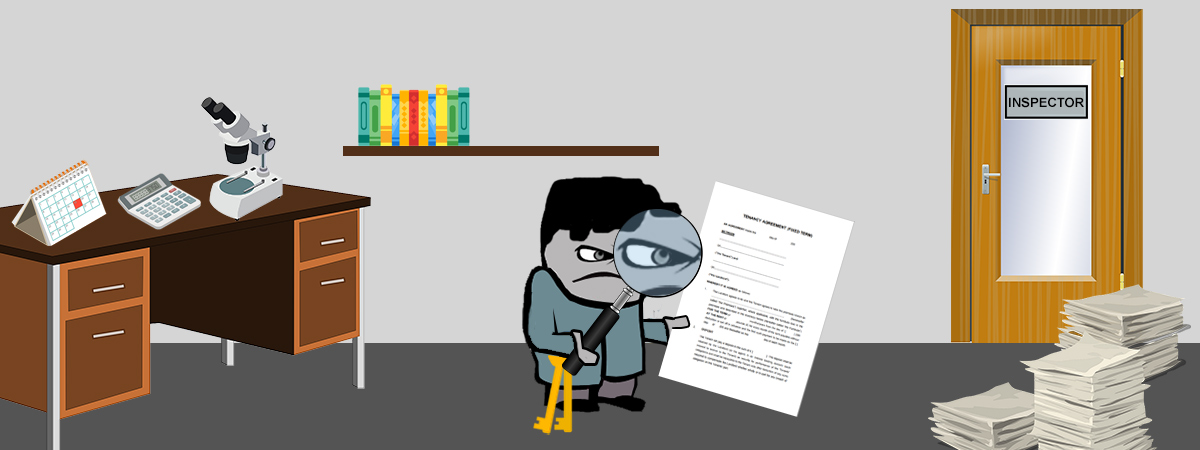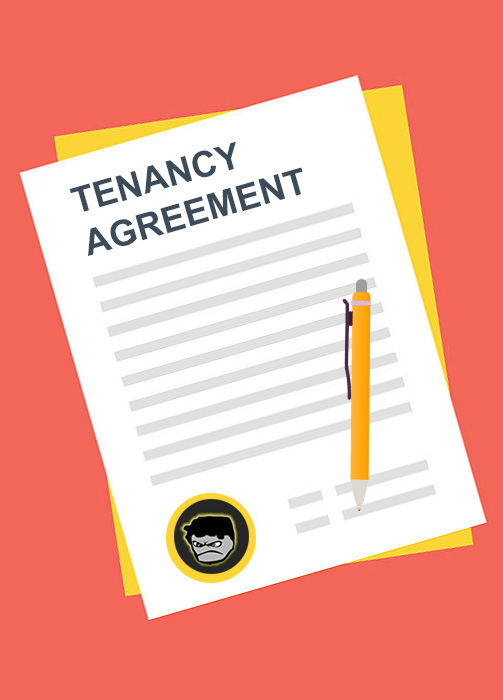
I’ve always maintained that most of the Tenancy Agreements out in the wild and available off-the-shelf are a pile of crap, especially the freebies floating around on the web.
If they’re not criminally out of date, they’re poorly formatted and/or butchered by cowboy landlords riddling them with their own unenforceable clauses, essentially contaminating them with nonsense. And before you know it, they spread like wildfire as they get passed from one landlord to another, many of them leaving their own mark before passing them on.
Actually READ your Tenancy Agreement
Firstly, I know for a fact that a large number of people don’t even bother reading Tenancy Agreements. This holds true for both landlord and tenant. Last week a new tenant of mine signed a contract without even reading it, he just quickly shuffled through the pages and said, “I’ve seen a hundred of these, it looks pretty straightforward”
I wonder if he realised that NOT ALL TENANCY AGREEMENTS ARE THE SAME? Regardless, his negligence will cost him. The agreement says I’m allowed to have sex with his wife whenever I want. Even while he’s having sex with her.
Additionally, landlords have been known to stuff their Tenancy Agreements with greed related clauses, which in some cases can be enforced, and in other cases, simply can’t.
It’s always advised to read tenancy agreements entirely, so every last detail is completely digested before signing.
Areas I pay attention to when looking at a Tenancy Agreement
Is the Tenancy Agreement suitable?
A friend of mine once had a “live-in” landlord, but the Tenancy Agreement had clauses regarding the Landlord’s right of entry. Clearly unsuitable. Especially since the occupant (my friend) was most likely a lodger, and not a tenant at all, yet was given an assured shorthold tenancy agreement to sign.
A more common scenario of using an incorrect Tenancy Agreements is when the property is furnished, but the tenancy agreement is for an unfurnished property.
Ensure the Tenancy Agreement is actually the correct type for the property and circumstances.
Is the Tenancy Agreement up-to-date?
Unfortunately there are a lot of vintage Tenancy Agreements in circulation, so you need to be careful before you download the first “free” copy you come across online.
I’ve even seen letting agents use versions that are more than a decade old. Worrying. But not surprising.
I always look out for mention of the Tenancy Deposit Scheme. The Tenancy Deposit Scheme was introduced in 2007, so if there’s no mention of it in the contract, you know it’s NOT suitable for this decade.
Even more recently, GDPR came into effect on the 25th May 2018, and it applies to ALL landlords. What this means for letting agents and landlords is that all the documents/forms – which obviously includes a tenancy agreement – used to gather personal information from tenants should contain a privacy policy, clearly explaining why, how and for how long their information is controlled and processed.
For landlords in England only: on the 1st of June 2019, the “Tenant Fees Act 2019” came into force; its purpose is to ban and restrict letting agents and private landlords from charging tenants with certain fees, which includes ‘end of tenancy cleaning’ fees, excessive ‘late rent’ penalties, and various other fees.
The Act stipulates that the only fees chargeable (i.e. ‘Permitted Payments’) to tenants are the following:
- Rent
- Tenancy deposit
- Holding deposit
- Payments to change the tenancy when requested by the tenant.
- Payments associated with early termination of the tenancy, when requested by the tenant.
- Payments in respect of utilities, communication services, TV licence and council tax.
- A default fee for late payment of rent and replacement of a lost key/security device, where required under a tenancy agreement.
The default fee for late payment of rent can be charged where the rent payment has been outstanding for 14 days or more (from the date set out in the tenancy agreement). Any fee charged must be no more than 3% above the Bank of England’s base rate for each day that the payment has been outstanding.
So if you’re a landlord in England and you have a tenancy that started on or after 1st June 2019, and your tenancy agreement contains clauses which either fall outside of the above charges, or exceed the chargeable amounts of the ‘Permitted Payments’, then your contract is most likely outdated. At the very least, it doesn’t comply with the latest legislation.
Shameless plug (sorry)…
In my defence, I genuinely believe my tenancy agreements are decent!

Download Your Tenancy Agreement
- Only £4.99 - download once and unlimited use
- All of our Tenancy Agreements were originally drafted by specialist landlord law solicitors
- Provided in .doc format so fully editable
- Written in "plain English" with easy to understand terms and conditions
- GDPR updated
Is the Tenancy Agreement easy to understand?
For a Tenancy Agreement to be deemed fair it must meet the requirements as set out by the Regulations, which means the following must be adhered to:
- The terms in the contract must be in plain language which is clear and easy to understand
- The terms of the contract must be regarded as fair in terms of a fairness test
- The parties to the contract must have concluded the agreement in good faith.
Ensure the contract is easy to understand, so you’re not lost in any technical jargon.
Who is responsible for paying the bills?
Pay special attention to who is responsible for paying the bills- this should be stated in the Tenancy Agreement. This should include utility bills (gas, electricity and water) and also council tax.
Who is responsible for repairs and maintenance?
This is pretty self-explanatory. Check for any terms that stipulate who is responsible for repairs and maintenance.
Terms which stipulate that the Tenant is to pay for repairs which the Landlord is legally required to repair cannot be enforced by the Landlord, but it’s worth checking if clauses of that nature exist.
Standard details
All good Tenancy Agreements should contain the following information, all of which are considered pretty standard:
- Dates: The date on which the agreement was made.
- Landlord Details: The name and address details of the Landlord(s).
- Tenant Details: The name and address details of the Tenant(s).
- Property Details: The address details of the property being rented.
- Term: The start and end date of the tenancy. This is usually referred to as the “fixed term”
- Rent: This should include the amount of rent to be paid, the method and the date of payment.
- Deposit: This should include the amount of the deposit to be paid (if applicable), and what the deposit will cover.
- Deposit Scheme: This should contain the Tenancy Deposit Scheme the deposit is secured in.
- Landlord’s Obligations: This should include the responsibilities of the Landlord.
- Tenant’s Obligations: This should include the responsibilities of the Tenant.
- Other Special Provisions: This should include any other special provisions agreed upon between the parties, such as pets, smoking, sub-letting etc.
- Signatures: Both the Landlord(s) and the Tenant(s) need to sign both Tenancy Agreements.
Does the Tenancy Agreement require witnesses?
Although It is not legally required to have witnesses signing the Agreement, it is useful in cases where the signatures are disputed by either of the parties.
In my opinion, a Tenancy Agreement without a space for witnesses fails to be a complete agreement.
Areas to be careful of when looking at a Tenancy Agreement
Rent increase
Check for any clauses regarding the right to increase rent. From my experience, most Tenancy Agreements don’t allow rent increases until after the termination date of the tenancy. However, there are some Tenancy Agreements that allow the landlord to have a “rent increase review” midway through the tenancy. Something to keep an eye out for.
Are there any break clauses?
Look out for any break clauses. A break clause in a lease gives the tenant rights to terminate the agreement before the fixed term runs out. If a break clause exists, there are usually conditions on how to terminate the lease e.g. notice period.
It’s important to be aware of any break clauses so you’re not completely surprised if the tenant or landlord wants to terminate the agreement early.
Statutory rights
Every clause in a Tenancy Agreement MUST be “fair” otherwise the landlord could fall foul of the Unfair Contract Terms legislation.
Both landlords and tenants have statutory rights which cannot be overwritten in a Tenancy Agreement. Clauses put into a Tenancy Agreement which conflict with statutory rights will be invalid.
For example, be careful of Tenancy Agreements which state that the Landlord and/or Tenant is required to give 4 months notice before terminating a tenancy. That is not true. If the agreement is for a fixed term, a tenant has the right to leave on the last day of the fixed term without giving any notice. If they stay even one day over the fixed term, they will automatically become a periodic tenant and will have to give proper notice unless the landlord agrees to them leaving.
If you notice any terms in the contract which seem unfair, they probably are. In this case, I would advise seeking free legal advice from Citizens Advice to ensure everything is legit.
Any other suggestions?
Does anyone look at any other specific details in a Tenancy Agreement, or have any additional advice?

Download Your Tenancy Agreement
- Only £4.99 - download once and unlimited use
- All of our Tenancy Agreements were originally drafted by specialist landlord law solicitors
- Provided in .doc format so fully editable
- Written in "plain English" with easy to understand terms and conditions
- GDPR updated
Disclaimer: I'm just a landlord blogger; I'm 100% not qualified to give legal or financial advice. I'm a doofus. Any information I share is my unqualified opinion, and should never be construed as professional legal or financial advice. You should definitely get advice from a qualified professional for any legal or financial matters. For more information, please read my full disclaimer.


 Landlord Products / Services
Landlord Products / Services








Great site with loads of useful articles. This is a really comprehensive guide.
My husband used to be a lettings agent and we weren't aware of all the intricacies until he he was working as a lettings agent. However, these contracts only hold to a certain degree, if they break the law, it is the law that overrides the contract. For example, if the tenancy agreement says that the landlord only needs to give 12 hours notice to enter the property it will be overrided by the law which requires 24 hours notice.
In other words, just because it is written in the contract doesn't mean you are bound to it, because what is in the tenancy agree may be illegal.